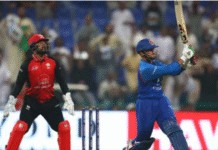
Budding footballers of the famed Kalsindur village of the Dhobaura upazila in Mymensingh have been confined to practising in their courtyards after a double whammy; the coronavirus pandemic paired with flash floods.
The young girls, some of whom have represented the national team at age level and others hoping to emulate that feat, have been left with little to survive with, let alone play football.
According to Kalsindur Govt School and College principal Mala Rani Sarker, the village currently boasts around 50 active female footballers. 14 play for age-level national teams or the women’s national team. The rest ply their trade in local and district competitions.

“As Kalsindur has earned name and fame from football throughout the country and abroad, we are trying to produce more football talents through our limited efforts”, Mala told this correspondent.
But the past four months have been very difficult. Mala claimed that these girls did not get any support from official quarters, adding that she and her peers, with assistance from some affluent people, arranged relief materials for 40 girls before Eid-ul-Fitr.
Mohammad Juel Rana, coach of the Kalsindur girls’ football team, said it was becoming increasingly difficult to continue coaching. The young man gets only Tk 5000 as a monthly honorarium from the school and it is only due to his devotion to the game that he is continuing, he claimed.
Unfortunately, the current crisis is not the first setback to the fertile breeding ground for footballers. The village’s primary school, which produced famed players such as Sanjida Akter, Tahura Khatun, Maria Manda, Sajeda Akter, Shamsunnahar Sr and Shamsunnahar Jr, saw football activities cease completely in 2018 due to a row over the credit for these players’ success.
According to local sources said, the row started in 2016 between Kalsindur Govt Primary School and Kalsindur Govt School and College over credit for the success.
Mofiz Uddin — a former assistant teacher of the primary school who had coached the institution to a hattrick of titles in the Bangamata Begum Fazilatunnesa Mujib Gold Cup from 2013 to 2015 — was eventually transferred to another school and football activities at the primary school were stopped. The consequence for the schools from the famed football village was failure at the national level.
Despite all that, there are several players from that successful period who are very much part of the national team set up.
Sanjida is such an example, having graduated from the primary school well before the infamous row and claiming a regular place in the national team. She is nurtured and trained by the BFF along with 40-plus others round-the-year.
“I want to improve my performance and I dream of playing in the Club World Cup one day”, the 19-year-old midfielder said.
But her plans have been upended and she is now training at home. Sanjida was playing for Bashundhara Kings in the long-awaited women’s football league in mid-March when the pandemic broke out, forcing the BFF to halt the league.
Having been away from the game for four months, Sanjida is trying her best to maintain fitness by following BFF coach Golam Rabbani Choton’s instructions, which she receives online.
Like Sanjida, Shamsunnahar Jr, captain of the under-15 national women’s team, is training at home and sends footage to the BFF every week for further instructions.
“I suffered huge mental pressure when I lost my mother when I was a fifth-grader. But I want to do well in football and lead a decent life with my siblings and ailing father,” Shamsunnahar said.
Both Sanjida and Shamsunnahar know online instructions and individual drills are a far cry from the experience they garner from BFF camps or competitive matches, domestic or international.
They know their current test is navigating through this situation, but once the twin crises are over, their skills and fitness will face a much sterner test.









